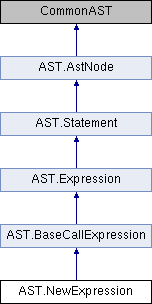Encapsulates a new expression. More...

Public Member Functions | |
| NewExpression (string type, CompoundExpression arguments, Location location) | |
| Constructor of NewExpression More... | |
| override Object | Accept (Visitor v, Object o) |
| Accept method of a concrete visitor. More... | |
| override object | AcceptOperation (AstOperation op, object arg) |
| Dispatches expressions to the operation passed as argument. It provokes the execution of op.AcceptOperation(AstNode) with the parameter resolved polymorfically More... | |
 Public Member Functions inherited from AST.BaseCallExpression Public Member Functions inherited from AST.BaseCallExpression | |
| BaseCallExpression (CompoundExpression arguments, Location location) | |
| Constructor of BaseCallExpression More... | |
 Public Member Functions inherited from AST.Expression Public Member Functions inherited from AST.Expression | |
| Expression | CloneInit () |
| Clones the initialization of the current object. More... | |
 Public Member Functions inherited from AST.Statement Public Member Functions inherited from AST.Statement | |
| override object | AcceptOperation (AstOperation op, object arg) |
| Dispatches expressions to the operation passed as argument. It provokes the execution of op.AcceptOperation(AstNode) with the parameter resolved polymorfically More... | |
 Public Member Functions inherited from AST.AstNode Public Member Functions inherited from AST.AstNode | |
| override bool | Equals (object obj) |
| AntLR compares Nodes with the class name. This is not correct for our purposes. More... | |
| override int | GetHashCode () |
Properties | |
| string | TypeInfo [get] |
| Gets the name of the new type More... | |
| TypeExpression | NewType [get, set] |
 Properties inherited from AST.BaseCallExpression Properties inherited from AST.BaseCallExpression | |
| CompoundExpression | Arguments [get] |
| Gets the arguments to invoke in the expression More... | |
| TypeExpression | BaseType [get, set] |
| The type of the base reference More... | |
| TypeExpression | ActualMethodCalled [get, set] |
| The actual method called once overload has been solved. More... | |
 Properties inherited from AST.Expression Properties inherited from AST.Expression | |
| TypeExpression | ExpressionType [get, set] |
| Gets or sets the type of the expression. More... | |
| bool | Lvalue [get, set] |
| Gets or sets the lvalue. More... | |
| bool | LeftExpression [get, set] |
| Gets or sets true if the expression is allocated in the left part of an assignment, false otherwise. More... | |
| virtual TypeExpression | ILTypeExpression [get] |
| Gets the type expression to use in code generation. More... | |
 Properties inherited from AST.AstNode Properties inherited from AST.AstNode | |
| Location | Location [get] |
Additional Inherited Members | |
 Protected Member Functions inherited from AST.Expression Protected Member Functions inherited from AST.Expression | |
| Expression (Location location) | |
| Protected constructor of Expresion. More... | |
 Protected Member Functions inherited from AST.Statement Protected Member Functions inherited from AST.Statement | |
| Statement (Location location) | |
| Protected constructor of Statement. More... | |
 Protected Member Functions inherited from AST.AstNode Protected Member Functions inherited from AST.AstNode | |
| AstNode (Location location) | |
| Protected constructor of NodeAst More... | |
 Protected Attributes inherited from AST.Expression Protected Attributes inherited from AST.Expression | |
| TypeExpression | frozenTypeExpression |
| WriteType variable may change its type's substitution (e.g., field type variables) This attribute saves the type in an specific time (frozen). If this type's substitution changes, the frozen type does not. More... | |
 Protected Attributes inherited from AST.AstNode Protected Attributes inherited from AST.AstNode | |
| Location | location |
| Location: Encapsulates in one object the line, column and filename More... | |
Detailed Description
Encapsulates a new expression.
Inheritance: BaseCallExpression. Implements Composite pattern [Composite]. Implements Visitor pattern [Concrete Element].
Definition at line 36 of file NewExpression.cs.
Constructor & Destructor Documentation
| AST.NewExpression.NewExpression | ( | string | type, |
| CompoundExpression | arguments, | ||
| Location | location | ||
| ) |
Constructor of NewExpression
- Parameters
-
type TypeExpression to create. arguments Arguments of the invocation. fileName File name. lineNumber Line number. columnNumber Column number.
Definition at line 82 of file NewExpression.cs.
Member Function Documentation
|
virtual |
Accept method of a concrete visitor.
- Parameters
-
v Concrete visitor o Optional information to use in the visit.
- Returns
- Optional information to return
Reimplemented from AST.BaseCallExpression.
Definition at line 98 of file NewExpression.cs.
|
virtual |
Dispatches expressions to the operation passed as argument. It provokes the execution of op.AcceptOperation(AstNode) with the parameter resolved polymorfically
- Parameters
-
op AstOperation to dispatch
- Returns
Reimplemented from AST.BaseCallExpression.
Definition at line 113 of file NewExpression.cs.
Property Documentation
|
getset |
The type expression of what is being created
Definition at line 65 of file NewExpression.cs.
|
get |
Gets the name of the new type
Definition at line 58 of file NewExpression.cs.
The documentation for this class was generated from the following file:
- C:/Users/ortin/Desktop/stadyn/Inference/src/AST/NewExpression.cs
